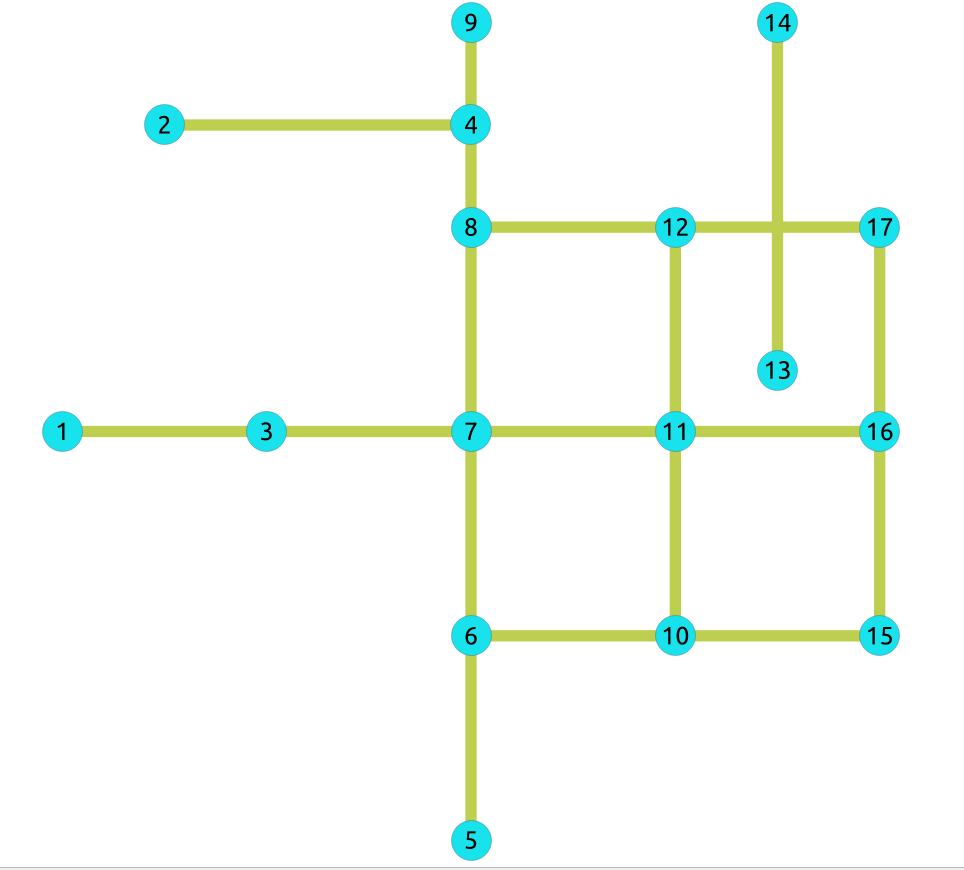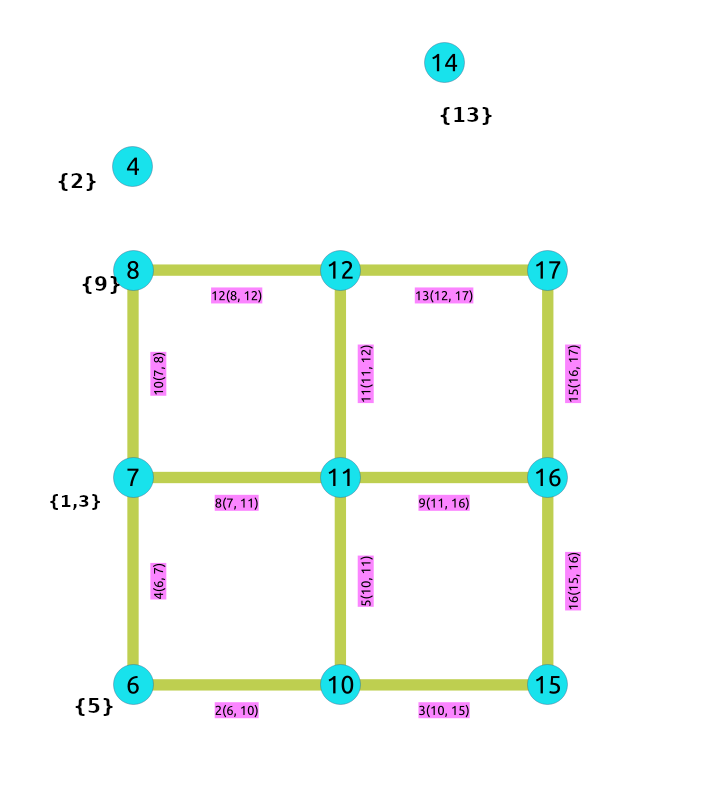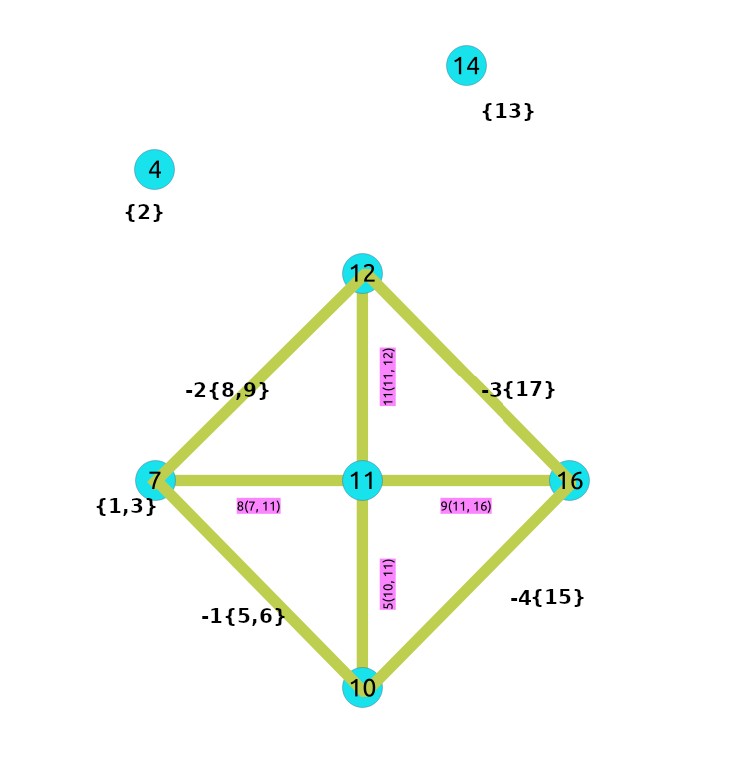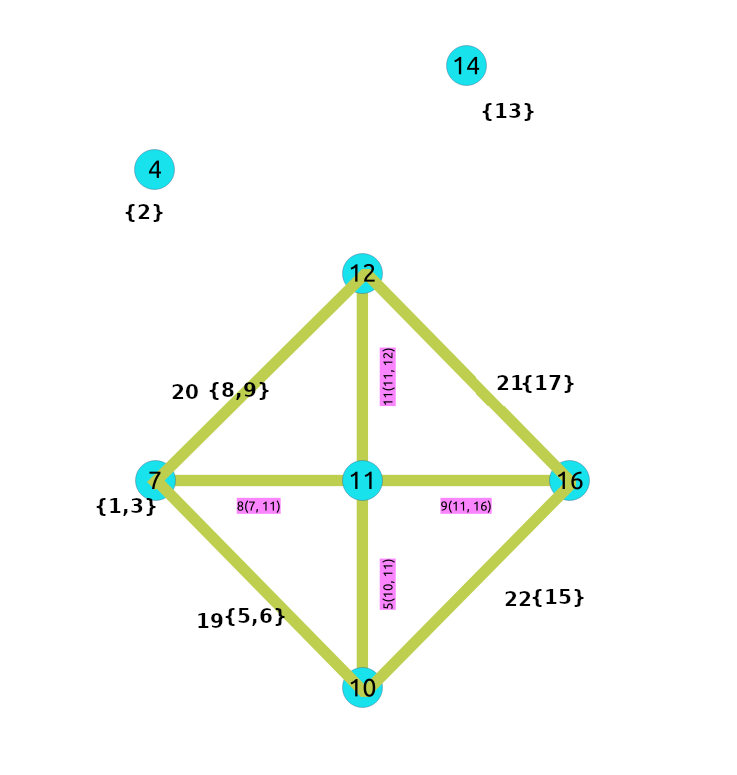Unsupported versions:2.6 2.5 2.4 2.3
pgr_contraction¶
pgr_contraction — 执行图收缩操作并返回收缩后的顶点和边。
可用性
Version 3.8.0
新签名:
之前必需的参数 Contraction order 现在已变为可选参数,并更名为
methods。可选参数的新名称和顺序。
已弃用签名 pgr_contraction(text,bigint[],integer,bigint[],boolean)
版本3.0.0
结果列更改:删除了
seqpgr_contractGraph的名称更改Bug修复
函数正式发布。
版本2.3.0
新实验性功能。
描述¶
收缩通过移除部分顶点和边来减小图的大小,例如,可以添加代表原始边序列的边,从而减少图算法所用的总时间和空间。
主要特点是:
仅在具有正成本的边进行处理。
不返回完整的收缩图。
仅返回图中的变更部分。
返回值包括:
线性收缩生成的新边线集。
断头节点收缩生成的修改后顶点集。
返回值的排序如下:
列
id升序排列。列
id中的负数,当它是一条新边时,负数依次递减。
目前,该功能包含两种收缩方法:
死角收缩。参考 pgr_contractionDeadEnd - 提议中。
线性收缩。参考 pgr_contractionLinear - 提议中。
签名¶
[directed, methods, cycles, forbidden](type, id, contracted_vertices, source, target, cost)- 示例:
在无向图上依次执行断头节点收缩与线性收缩。
SELECT * FROM pgr_contraction(
'SELECT id, source, target, cost, reverse_cost FROM edges', false);
type | id | contracted_vertices | source | target | cost
------+----+---------------------+--------+--------+------
v | 4 | {2} | -1 | -1 | -1
v | 7 | {1,3} | -1 | -1 | -1
v | 14 | {13} | -1 | -1 | -1
e | -1 | {5,6} | 7 | 10 | 2
e | -2 | {8,9} | 7 | 12 | 2
e | -3 | {17} | 12 | 16 | 2
e | -4 | {15} | 10 | 16 | 2
(7 rows)
参数¶
参数 |
类型 |
描述 |
|---|---|---|
|
Edges SQL 如下所述。 |
可选参数¶
列 |
类型 |
默认 |
描述 |
|---|---|---|---|
|
|
|
|
可选收缩参数¶
列 |
类型 |
默认 |
描述 |
|---|---|---|---|
|
|
|
有序收缩操作。
|
|
|
收缩方法的执行次数。 |
|
|
|
|
禁止收缩的顶点标识符。 |
内部查询¶
Edges SQL¶
列 |
类型 |
默认 |
描述 |
|---|---|---|---|
|
ANY-INTEGER |
边的标识符。 |
|
|
ANY-INTEGER |
边的第一个端点顶点的标识符。 |
|
|
ANY-INTEGER |
边的第二个端点顶点的标识符。 |
|
|
ANY-NUMERICAL |
edge ( |
|
|
ANY-NUMERICAL |
-1 |
边(
|
其中:
- ANY-INTEGER:
SMALLINT,INTEGER,BIGINT- ANY-NUMERICAL:
SMALLINT,INTEGER,BIGINT,REAL,FLOAT
结果列¶
Returns set of (type, id, contracted_vertices, source, target, cost)
该函数返回一行数据。该行的列包括:
列 |
类型 |
描述 |
|---|---|---|
|
|
行的类型。
|
|
|
此列中的所有数字都是
|
|
|
收缩顶点标识符数组。 |
|
|
|
|
|
|
|
|
|
其他示例¶
仅死端收缩¶
SELECT type, id, contracted_vertices FROM pgr_contraction(
'SELECT id, source, target, cost, reverse_cost FROM edges',
methods => ARRAY[1]);
type | id | contracted_vertices
------+----+---------------------
v | 4 | {2}
v | 6 | {5}
v | 7 | {1,3}
v | 8 | {9}
v | 14 | {13}
(5 rows)
仅线性收缩¶
SELECT * FROM pgr_contraction(
'SELECT id, source, target, cost, reverse_cost FROM edges',
methods => ARRAY[2]);
type | id | contracted_vertices | source | target | cost
------+----+---------------------+--------+--------+------
e | -1 | {3} | 1 | 7 | 2
e | -2 | {3} | 7 | 1 | 2
(2 rows)
循环¶
对图进行收缩可通过多次操作实现,操作顺序会影响最终收缩图的结果——每执行一次操作后,可被后续操作收缩的顶点集合将发生变化。
这种实现方式在 methods 中循环 cycles 次。
<input>
do max_cycles times {
for (operation in operations_order)
{ do operation }
}
<output>
收缩示例数据¶
在本节中,将通过示例展示构建和使用收缩图。
使用无向图的 示例数据
首先是死端操作,然后是线性操作。
数据库中图的构建¶
原始图:

结果数据并非表示收缩后的图,而是反映应用收缩方法后需对原图执行的变更操作。
例如,观察到顶点
SELECT * FROM pgr_contraction(
'SELECT id, source, target, cost, reverse_cost FROM edges', false);
type | id | contracted_vertices | source | target | cost
------+----+---------------------+--------+--------+------
v | 4 | {2} | -1 | -1 | -1
v | 7 | {1,3} | -1 | -1 | -1
v | 14 | {13} | -1 | -1 | -1
e | -1 | {5,6} | 7 | 10 | 2
e | -2 | {8,9} | 7 | 12 | 2
e | -3 | {17} | 12 | 16 | 2
e | -4 | {15} | 10 | 16 | 2
(7 rows)
进行死端收缩操作后:

对上图进行线性收缩运算后:

在数据库上创建收缩图的过程:¶
添加附加列¶
在边表和顶点表中添加额外列。在本文档中将使用以下内容:
Column. |
描述 |
|---|---|
|
属于顶点/边的顶点集 |
|
在顶点表上
|
|
在边表上
|
ALTER TABLE vertices
ADD is_contracted BOOLEAN DEFAULT false,
ADD contracted_vertices BIGINT[];
ALTER TABLE
ALTER TABLE edges
ADD is_new BOOLEAN DEFAULT false,
ADD contracted_vertices BIGINT[];
ALTER TABLE
存储收缩信息¶
将收缩结果存储至数据表。
SELECT * INTO contraction_results
FROM pgr_contraction(
'SELECT id, source, target, cost, reverse_cost FROM edges', false);
SELECT 7
更新边线与顶点表¶
使用 is_contracted 列来指示收缩的顶点。
UPDATE vertices
SET is_contracted = true
WHERE id IN (SELECT unnest(contracted_vertices) FROM contraction_results);
UPDATE 10
将属于顶点的结果信息填充至 contracted_vertices 表中。
UPDATE vertices
SET contracted_vertices = contraction_results.contracted_vertices
FROM contraction_results
WHERE type = 'v' AND vertices.id = contraction_results.id;
UPDATE 3
插入由 pgr_contraction 生成的新边。
INSERT INTO edges(source, target, cost, reverse_cost, contracted_vertices, is_new)
SELECT source, target, cost, -1, contracted_vertices, true
FROM contraction_results
WHERE type = 'e';
INSERT 0 4
收缩图¶
属于收缩图的顶点。
SELECT id FROM vertices WHERE is_contracted = false ORDER BY id;
id
----
4
7
10
11
12
14
16
(7 rows)
属于收缩图的边。
WITH
vertices_in_graph AS (SELECT id FROM vertices WHERE is_contracted = false)
SELECT id, source, target, cost, reverse_cost, contracted_vertices
FROM edges
WHERE
EXISTS (SELECT id FROM vertices AS v WHERE NOT is_contracted AND v.id = edges.source)
AND
EXISTS (SELECT id FROM vertices AS v WHERE NOT is_contracted AND v.id = edges.target)
ORDER BY id;
id | source | target | cost | reverse_cost | contracted_vertices
----+--------+--------+------+--------------+---------------------
5 | 10 | 11 | 1 | -1 |
8 | 7 | 11 | 1 | 1 |
9 | 11 | 16 | 1 | 1 |
11 | 11 | 12 | 1 | -1 |
19 | 7 | 10 | 2 | -1 | {5,6}
20 | 7 | 12 | 2 | -1 | {8,9}
21 | 12 | 16 | 2 | -1 | {17}
22 | 10 | 16 | 2 | -1 | {15}
(8 rows)
视觉效果:

使用收缩图¶
根据最终应用的需求,图需要进行预处理。在本示例中,最终应用是使用收缩图通过 pgr_dijkstraCost 计算原始图中两个顶点之间的成本
计算收缩图中给定源和目标之间的最短路径时,存在三种情况:
情况1:源和目标都属于收缩图。
情况 2:源和/或目标属于边缘子图。
情况 3:源和/或目标属于一个顶点。
最终应用应考虑所有这些情况。
创建收缩图的视图(或表):
DROP VIEW IF EXISTS contracted_graph;
NOTICE: view "contracted_graph" does not exist, skipping
DROP VIEW
CREATE VIEW contracted_graph AS
SELECT id,source, target, cost, reverse_cost, contracted_vertices FROM edges
WHERE
EXISTS (SELECT id FROM vertices AS v WHERE NOT is_contracted AND v.id = edges.source)
AND
EXISTS (SELECT id FROM vertices AS v WHERE NOT is_contracted AND v.id = edges.target);
CREATE VIEW
创建使用收缩图的函数。
CREATE OR REPLACE FUNCTION path_cost(source BIGINT, target BIGINT)
RETURNS SETOF FLOAT AS
$BODY$
SELECT agg_cost FROM pgr_dijkstraCost(
/* The inner query */
'WITH
cul_de_sac AS (
SELECT contracted_vertices || id::INTEGER as v
FROM vertices WHERE ' || $1 ||' = ANY(contracted_vertices)
OR ' || $2 ||' = ANY(contracted_vertices)),
linears_to_expand AS (
SELECT id, contracted_vertices
FROM edges WHERE is_new AND (' || $1 ||' = ANY(contracted_vertices)
OR '|| $2 ||' = ANY(contracted_vertices))
),
additional_vertices AS (
SELECT * FROM cul_de_sac UNION SELECT contracted_vertices FROM linears_to_expand)
SELECT id, source, target, cost, reverse_cost
FROM edges, additional_vertices WHERE source = ANY(v) OR target = ANY(v)
UNION
SELECT id, source, target, cost, reverse_cost
FROM contracted_graph LEFT JOIN linears_to_expand c USING (id) WHERE c.id IS NULL',
source, target, false);
$BODY$ LANGUAGE SQL;
CREATE FUNCTION
情况1:源和目标都属于收缩图。
SELECT * FROM path_cost(10, 12);
path_cost
-----------
2
(1 row)
情况 2:源点和/或目标点位于含收缩顶点的边线上。
SELECT * FROM path_cost(15, 12);
path_cost
-----------
3
(1 row)
情况 3:源点和/或目标点属于已被收缩的顶点。
SELECT * FROM path_cost(15, 1);
path_cost
-----------
5
(1 row)
另请参阅¶
索引和表格
